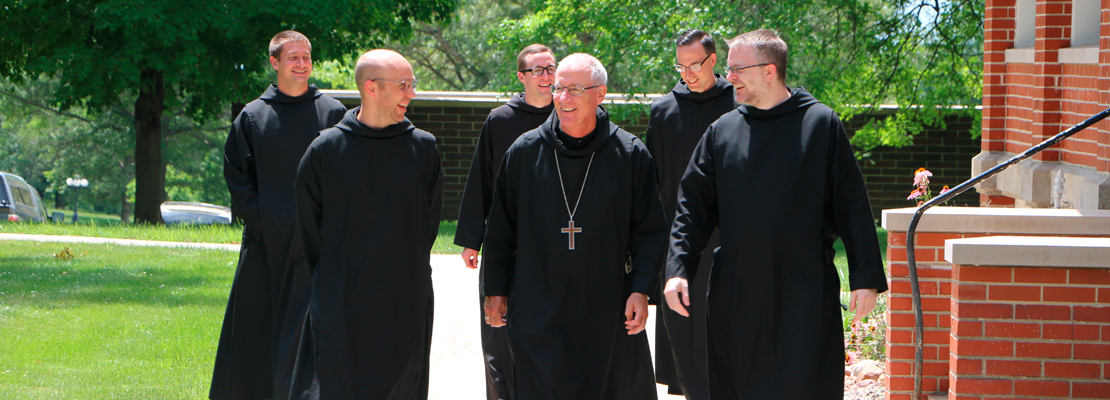
That Monk Does What?
A look into the little-known titles of monastic assignments
Prior |
Custos |
Cellarer |
Porter |
Refectorian |
Intentionarius |
Infirmarian |
What kind of work do the monks do? There are many job assignments that take place within the monastery itself, often hidden from the public eye, but just as important for the daily upkeep of the monastery and for serving the community. Though the monks refer to these roles often, as they are mentioned in the Rule of St. Benedict, the names or titles of these assignments are sometimes not quite clear to those outside the cloister. What do these titles mean? What responsibilities do they entail? In order to help you understand these assignments, we present to you the lesser known monastic jobs.
— Descriptions written by Br. Bernard Montgomery, OSB
The Prior of the monastery is the monk who is selected by the Abbot to be second-in-command within the ranks of the community. He assumes the superior’s role whenever the Abbot is absent from the monastery and fills in for him whenever he is not present. His functioning might be 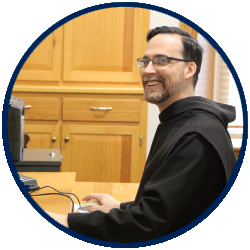 compared to that of a vice president; and we know that vice presidents must remember their place. St. Benedict devotes one chapter in the Holy Rule to the Prior, and the poor man is mercilessly told to stay in line—or else. St. Benedict must have had problems with his second-in-command, but thankfully such is not the case today when we witness only the best cooperation on the part of this devoted and attentive monk who takes care of many of the practical and day to day details of living in community. He makes weekly assignments, oversees transportation needs, notifies members of upcoming changes in the daily schedule, gets the elderly to their medical appointments, and takes care of various unforeseen circumstances.
compared to that of a vice president; and we know that vice presidents must remember their place. St. Benedict devotes one chapter in the Holy Rule to the Prior, and the poor man is mercilessly told to stay in line—or else. St. Benedict must have had problems with his second-in-command, but thankfully such is not the case today when we witness only the best cooperation on the part of this devoted and attentive monk who takes care of many of the practical and day to day details of living in community. He makes weekly assignments, oversees transportation needs, notifies members of upcoming changes in the daily schedule, gets the elderly to their medical appointments, and takes care of various unforeseen circumstances.
Br. Anselm currently serves as Prior.
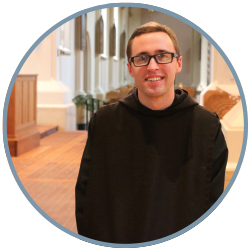
This monk is responsible for the upkeep and general maintenance of the Basilica; an overseer of the building, both its interior and exterior. Heensures that squeaky doors get oiled and that lights get replaced. He also sees to such things as the cleaning of the building, decorating for feasts and solemnities, maintaining the liturgical vestments that are needed throughout the year, purchasing supplies and submitting an annual budget. He sometimes is called the Church Manager, but as in many other things, the monks hold on to this Latin title for this special guardian of our beloved Basilica.
Br. Maximilian currently serves as Custos.
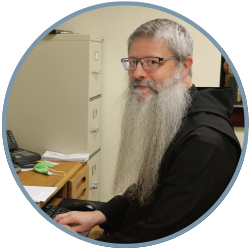
The cellarer of the monastery is designated by the Abbot to see to it that the physical needs of the brethren are met. In earlier times, this meant more specifically being in charge of the cellar where the provisions of food and drink were stored. In our own time, many communities now refer to this person as the “Business Manager,” but the duties remain very much the same; though as you might expect, they have greatly increased in number, scope and complexity. Requests of all kinds land on this brother’s desk, so he must be a wise judge and know how to respond to each accordingly. This is an individual for whom St. Benedict had the highest respect writing that he should be “…like a father to the whole community” (RB 31, 2). Conception Abbey has been blessed with many such prudent and wise fathers throughout her history.
Br. Jacob currently serves as Cellarer.
St. Benedict wrote in the Holy Rule: “At the door of the monastery, place a sensible old man who knows how to take a message and deliver a reply, and whose age keeps him  from roaming about” (RB 66, 1). This verse always brings a smile to the faces of the brethren when it is read in the refectory, especially the part concerning “not roaming about.”In other words, the porter at the monastery is a greeter, an official of hospitality, someone who will welcome a guest or visitor and be able to show them the right place to go, or to help them find the person they have come to see.In our own day, with many demands placed upon this person, a younger man frequently is the better choice. For many who visit the Abbey, the porter may be the only monk they will encounter, depending on the length of their stay, so St. Benedict is insistent that he greet the visitor “…with all the gentleness that comes from the fear of God.” It is a ministry of hospitality and an acknowledgement of the presence of Christ in every person.
from roaming about” (RB 66, 1). This verse always brings a smile to the faces of the brethren when it is read in the refectory, especially the part concerning “not roaming about.”In other words, the porter at the monastery is a greeter, an official of hospitality, someone who will welcome a guest or visitor and be able to show them the right place to go, or to help them find the person they have come to see.In our own day, with many demands placed upon this person, a younger man frequently is the better choice. For many who visit the Abbey, the porter may be the only monk they will encounter, depending on the length of their stay, so St. Benedict is insistent that he greet the visitor “…with all the gentleness that comes from the fear of God.” It is a ministry of hospitality and an acknowledgement of the presence of Christ in every person.
Br. Matthew currently serves as Porter.
The refectorian is the monk who is assigned to take care of—well, of course,—the refectory, the latter being a little used word these days, except in monasteries and seminaries, meaning a dining room. The name derives from the Latin reficere “to remake or restore,” thus refectorium means “a place one goes to be restored,” and what better restores a person than a good meal? 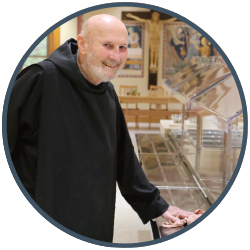 Like all dining areas, a lot of attention is required to take care of such an area, and this is the responsibility of the refectorian who daily puts out the food sent from the kitchen for the monk’s meals and then sees to it that leftovers are sent back. Cleaning and maintenance is a priority, and thus it falls to the refectorian to clean and sweep as necessary—which is common with up to 30 monks eating at one sitting. The refectorian’s work is demanding enough that several monks are assigned as helpers, thus carrying out St. Benedict’s instruction “…let everyone receive help as the size of the community or local conditions warrant” (RB 35, 4).
Like all dining areas, a lot of attention is required to take care of such an area, and this is the responsibility of the refectorian who daily puts out the food sent from the kitchen for the monk’s meals and then sees to it that leftovers are sent back. Cleaning and maintenance is a priority, and thus it falls to the refectorian to clean and sweep as necessary—which is common with up to 30 monks eating at one sitting. The refectorian’s work is demanding enough that several monks are assigned as helpers, thus carrying out St. Benedict’s instruction “…let everyone receive help as the size of the community or local conditions warrant” (RB 35, 4).
Br. Blaise (pictured), Br. Thomas, and Br. Placid currently serve as Refectorians.
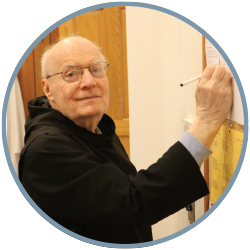 Again, we are dealing with a Latin word, this one derived from intentio meaning “aim” or “intention.” Does the monastery have a monk who spends all of his time just thinking about various intentions? No, not various intentions, rather specific intentions. The Intentionarius has the responsibility for handling all of the Mass requests (intentions) that come to the Abbey. He sees to it that they are properly recorded and that the Masses are faithfully fulfilled.
Again, we are dealing with a Latin word, this one derived from intentio meaning “aim” or “intention.” Does the monastery have a monk who spends all of his time just thinking about various intentions? No, not various intentions, rather specific intentions. The Intentionarius has the responsibility for handling all of the Mass requests (intentions) that come to the Abbey. He sees to it that they are properly recorded and that the Masses are faithfully fulfilled.
Fr. Quentin currently serves as Intentionarius.
 Here we have the title of the monk who St. Benedict says is to attend to the needs of those who are ill. In one of the most beautiful sentences from the Holy Rule, we read: “Care of the sick must rank above and before all else, so that they may truly be served as Christ” (RB 36, 1). In St. Benedict’s time, the only prerequisite for this position was that the brother be “…God-fearing, attentive and concerned.” While these attributes are as valid today as they were in the sixth century, the infirmarian of our time must also be well-trained, knowledgeable, and informed with appropriate professional training. Whether in the sixth century or the twenty-first, monks continue to benefit from the devoted attention of the Infirmarian.
Here we have the title of the monk who St. Benedict says is to attend to the needs of those who are ill. In one of the most beautiful sentences from the Holy Rule, we read: “Care of the sick must rank above and before all else, so that they may truly be served as Christ” (RB 36, 1). In St. Benedict’s time, the only prerequisite for this position was that the brother be “…God-fearing, attentive and concerned.” While these attributes are as valid today as they were in the sixth century, the infirmarian of our time must also be well-trained, knowledgeable, and informed with appropriate professional training. Whether in the sixth century or the twenty-first, monks continue to benefit from the devoted attention of the Infirmarian.
Br. Jonathan currently serves as Infirmarian.
Posted in General, Monastery News
